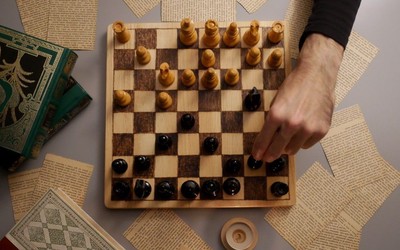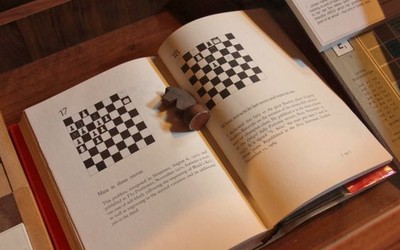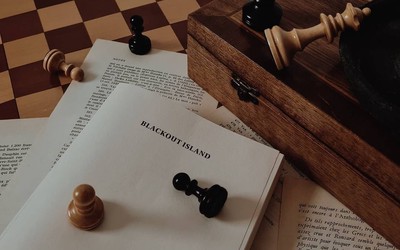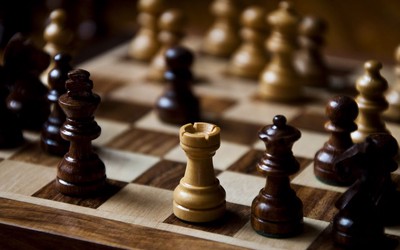
Famous Chess Players Throughout History.
Below are a chronological list of some of the best players in history, a description of their style illustrated by a few games, and a description of their personality. Try and feel their style when you watch the games.1837-1884: Paul Morphy (Sacrificial for Activity)
Context: Morphy’s family was incredibly rich which gave him a lot of resources to hone his potential. As a 12 year old, Morphy easily defeated some of the best chess players in the world, and came up with unique, and beautiful ideas which changed the way chess was played. There was no world championships during his time. So he later became a lawyer, and was embarrassed as being known as a chess player. Apparently he was liked by everyone around him, but in the final years of his life, he started to become incredibly depressed and paranoid. He died from a stroke in his bathtub which was likely caused by the cold water (according to the autopsy). He was known as the pride and sorrow of chess.
Style: His style was fundamentally positional and revolved around maximizing the activity of his pieces. When this created tactical possibilities, he quickly identified them and executed them with absolute precision. Additionally, he’d restrict the maneuverability and power of enemy pieces wherever possible, typically via tactical motifs like pinning. It differed from his peers in that he played in a clear, principled manner before anyone knew the principles of Chess (which he helped create). His philosophy is best summed up in one of his quotes, “help your pieces so they can help you.”. Even though his style is quite romantic, and sacrificial, it was always sound – he seemed to be more concerned about achieving a winning position, as opposed to unnecessary risk in the hopes of a mate or blunder.
Games: https://www.chessgames.com/perl/chessgame?gid=1242884 https://www.chessgames.com/perl/chessgame?gid=1233404 https://www.chessgames.com/perl/chessgame?gid=1019060
1836 - 1900: Wilhelm Steinitz (Romantic for Position)
Context: Steinitz was ill-tempered and aggressive, but had good relations with the people who supported his views, which he defended fiercely. Steinitz grew up in the “Romantic” era of chess when the focus was more on elaborate attacks with tumultuous sacrifices. The attacks, though, had uncertain results. The strategy most often employed was that the attacking side would eventually end up losing the entire troop and thus, the game. He was known as the “Father of positional chess” despite his often romantic play, because he constantly started debates about positional chess beating romantic chess, which was later agreed upon. He was the first world champion.
Style: A worse Morphy, similar, but slightly more romantic to reach a nice position, mainly in an attempt to defend his philosophy, which went against his natural style. He was still amazing, with a very similar style to Morphy, just not as amazing. There is a difference between being sacrificial and romantic. Romantic is more about giving up material for the game (There is an immediate idea, whereas Morphy sacrificed for a nice position, knowing checkmate would come as a result, later down the line). Steinitz’s style was paradoxical, playing romantically to prove a point, getting into nice positional play, to prove that romantic play doesn’t work. Point is, he was very strong, and it worked.
Games: https://www.chessgames.com/perl/chessgame?gid=1132699 https://www.chessgames.com/perl/chessgame?gid=1224575 https://www.chessgames.com/perl/chessgame?gid=1036342
1880 - 1961: Akiba Rubenstein (Positional Grinder)
Context: Akiba was born into a large, poor family (the youngest of 12 brothers) and he devoted his whole life to chess. He was an incredible player, but due to financial reasons, he couldn’t participate in a world championship. He suffered from severe paranoia and social anxiety. He would often complain about a fly on his forehead whenever things went poorly for him. After he realised he couldn’t become world champion, he slowly gave up his only aspiration, was convinced to go to a psychiatrist, who said he was “crazy”, and he lived the rest of his life in a hospital in anonymity.
Style: Very positional and endgame oriented. He liked openings that gave him a slight edge, and he would just grind it out until the very end, like an anaconda slowly suffocating their opponent (if for instance, he ever got up a Pawn). Usually slow long games. Because of his style, he learned an immense amount of opening theory to find those early advantages to cling on to, and so every so often, he would win very early as well.
Games: https://www.chessgames.com/perl/chessgame?gid=1119679 https://www.chessgames.com/perl/chessgame?gid=1119734 https://www.chessgames.com/perl/chessgame?gid=1119726
1888 - 1942: José Raúl Capablanca (Calculating & Positional)
Context: Capablanca learned the moves of chess at the age of four by watching his father play, and he went on to defeat Cuba’s best player in 1901. Capablanca was relaxed and sociable, even holding an official position as his country’s ambassador-at-large (Cuba). He is known as the most naturally talented player ever. He was the 3rd world champion (After Emmanuel Lasker). And he was very liked by everyone around him.
Style: “I always play carefully and try to avoid unnecessary risks. I consider my method to be right as any superfluous ‘daring’ runs counter to the essential character of chess, which is not a gamble but a purely intellectual combat conducted in accordance with the exact rules of logic.” – Capablanca. I simply cannot emphasize just how amazing his calculating skills were. His ability to go into a slightly superior Pawn endgames (as in, his Pawns were slightly better placed) and win every time was astounding. It’s like he had calculated it from the start.
Games: https://www.chessgames.com/perl/chessgame?gid=1262431 https://www.chessgames.com/perl/chessgame?gid=1007846 https://www.chessgames.com/perl/chessgame?gid=1261680
1892 - 1946: Alexander Alekhine (Creative & Attacking)
Context: Alekhine was not liked by many people, apparently he was often drunk and was a compulsive liar. Many world championship matches that featured him fell through because of lots of controversy. Nevertheless, he beat Capablanca to become the 4th world champion, so he was incredible. Levon Aronian considers him the greatest player to ever live. His death is controversial as well, there are speculations that he was murdered by the soviets in his hotel because of his ties to Nazi Germany. He lived there and many anti-sematic material had his name on them (as an author), but he denies it, stating that the Nazis put his name on it themselves. When Alekhine died as world champion, FIDE began to attempt to create a system of world championships. But as you will soon see, the Soviet Union quickly gains control over world chess with huge government backing.
Style: His style is best described as this: He could find creative attacking ideas out of the driest positions. I don’t think I need to say anymore. But obviously even though all of these players had their own styles, there were all top level in every area (endgames, positional play, etc.), they just specialized in one or two areas. “Against Alekhine you never knew what to expect. Against Capablanca, you knew what to expect, but you couldn't prevent it!” – George Thomas (A chess master).
Games: https://www.chessgames.com/perl/chessgame?gid=1387586 https://www.chessgames.com/perl/chessgame?gid=1011705 https://www.chessgames.com/perl/chessgame?gid=1011813
1911 - 1995: Mikhail Botvinnik (Strategical & Technical)
Context: Botvinik was the 6th world champion, and the first to come out of the Soviet Union, which went on to churn out many world champions and completely dominate the world of chess. He also helped develop the ‘Soviet Chess School’, which was less of a particular school, as opposed to a style which was how the Soviet Union wanted young players to play to prove their intellectual superiority over the rest of the world. Lenin contributed and supported the ‘school’ with huge financial input, and Botvinik was the pioneer of this school. He helped many Soviet youth play in this style, which was fast-paced, daring, with a strong fundamental understanding of positional chess. So very long-term, strategic, and technical. It was said playing Botvinnik was like playing a bulldozer. Also, 10 of the world championships were held in Moscow for a home turf advantage. There were lots of Soviet controversies surrounding pre-arranged games to keep specific players in power. Back to Botvinnik though, he was known as an emotionless strict teacher.
Style: Botvinnik was a very long-term player, just like how the soviet chess school taught for many years after. Strangely though, he was more compared to Steinitz than his students that were meant to have his style. Regardless, Soviet chess was very concrete, correct, and dominating. Very minimal risk.
Games: https://www.chessgames.com/perl/chessgame?gid=1031957 https://www.chessgames.com/perl/chessgame?gid=1031670 https://www.chessgames.com/perl/chessgame?gid=1008239
1929 - 1984: Tigran Petrosian (Defensive & Solid)
Context: Tigran Petrosian was a Soviet Armenian, and the 9th world champion after beating Mikhail Tal (who comes up next). Petrosian was partially deaf[33] and wore a hearing aid during his matches, which sometimes led to strange situations. On one occasion he offered a draw to Svetozar Gligorić, which Gligorić initially refused in surprise, but then changed his mind in a few seconds and re-offered the draw. However, Petrosian did not even respond, instead went ahead and won the game. As it turned out, he switched off his hearing aid, and did not hear when Gligorić re-offered the draw. He was generally liked by everyone around him, very carefree. He grew up very poor and swept streets to earn barely enough to live. Luckily, because chess was so well funded, and because he was so talented, the government paid him more than enough to maintain his championship.
Style: He was known as “Iron Tigran” because of his almost impenetrable defensive playing style, which emphasized safety above all else. He just waited, defended, and then counter-attacked with that Soviet precision.
Games: https://www.chessgames.com/perl/chessgame?gid=1084331 https://www.chessgames.com/perl/chessgame?gid=1080837 https://www.chessgames.com/perl/chessgame?gid=1106134
1936 - 1992: Mikhail Tal (Sacrificial & Intuitive)
Context: Tal was a party guy. Very emotional, and always looking for the next adrenaline kick. Very nice, but also had huge spikes of depression. There are countless stories of his unpredictable and fun nature, like when he escaped hospital (which he was often admitted to due to all his health complications from his chain smoking and scarlet fever), to play in a blitz tournament, where he beat Kasparov (The 2nd greatest player to ever live (in my opinion)). It should be noted that he was also very well educated, wrote very well, and had a condition called Ectrodactyly (missing a finger or two – in his case, he had 3 fingers on his right hand). Tal was the 8th world champion (also Soviet).
Style: Like his personality, wild. But for a very practical purpose. He was well aware that his sacrifices were more than often not sound. But it made the game so confusing that his opponents either: got into time trouble and blundered, didn’t take the piece (which would win Tal material), or straight up ran out of time. If his sacrifices were sound, then his opponents would take the bait, and lose very quickly. Very rarely did opponents understand the sacrifice fully, and correctly took in a winning position and continued to win. In the blitz game against Kasparov, Kasparov correctly figured out that the sacrifice was unsound, and was winning – then ran out of time.
Games: https://www.chessgames.com/perl/chessgame?gid=1649293 https://www.chessgames.com/perl/chessgame?gid=1139196 https://www.chessgames.com/perl/chessgame?gid=1139184
1943 - 2008: Bobby Fischer (Aggressive & Accurate)
Context: There’s also lots to talk about this Fischer. He was incredibly naturally talented and had a point to prove: He could beat all the Russians and become world champion. Which he did. Fischer was the 11th world champion. But throughout his life he became more and more paranoid and spoiled. After he won the title, he commented on not having much purpose in life, and despite stating he was going to defend it for a long time, he disappeared for many more years to come. He resurfaced once or twice to play some matches illegally against top players to prove he could still beat them (which he could). And then died in Reykjavik. He was an anti-Semite, and constantly listened to conspiracy theories which he spoke about all day.
Style: His chess skill was one of the best ever, both naturally talented and hardworking, Fischer had an intuitive understanding of both accurate aggressive play, and positional conversion of any position. Many players with a point to prove play with aggression, and it worked. He was one of the most accurate players to ever live. Fischer single handily defeated the entire Soviet Union, despite multiple attempts of cheating against him, with no recourses.
Games: https://www.chessgames.com/perl/chessgame?gid=1008419 https://www.chessgames.com/perl/chessgame?gid=1008361 https://www.chessgames.com/perl/chessgame?gid=1044603
1948 - ? : Beth Harmon (Aggressive & Accurate)
Context: You likely already know everything I do about Harmon if you've seen the amazing Netflix series 'The Queens Gambit'. I believe that she was based on a mixture of Fischer and Polgar (who we will get to) in the way that their personalities effected their chess play. Remember, she too had a point to prove.
Style: Her style was the exact same as Fischer, precise and accurate, not rushed, or risky, just clinical.
Games: https://www.365chess.com/game.php?gid=4273872 & https://www.chessgames.com/perl/chessgame?gid=1271125 (This was her final game against Mr. Shaibel – taken from a real game played by one of the oldest players, and a romantic one, Greco).
1951- Present: Anatoly Karpov (Positional & Brutal)
Context: Karpov was the 12th world champion after Fischer disappeared and he won by default after qualifying. Therefore no one thought he deserved the title, and he had a chip on his shoulder about it. Then followed on of the longest reigning title defences in history (3rd longest after Kasparov and Lasker (2nd world champion)). He is an incredibly nice guy who is humble and has devoted himself to teaching in a nice way. He is also a national treasure of Russia and loved by all.
Style: Incredibly solid. Positional, but just waiting for the slightest weakness either positionally or tactically. He was incredibly sharp in both areas. But he is very well known for being the best positional player to ever live. His pieces always looked amazing, and his opponents did not. Sacrifices are not only played by players like Morphy, Tal, and Fischer. Sometimes sacrifices are simply the best moves. Karpov sacrificed too, for all sorts of different reasons. But be sure that when Karpov sacrifices, it’s not a bluff, it’s over.
Games: https://www.chessgames.com/perl/chessgame?gid=1067846 https://www.chessgames.com/perl/chessgame?gid=1067858 https://www.chessgames.com/perl/chessgame?gid=1069169
1963 - Present: Garry Kasparov (Dynamic & Tactical)
Context: Kasparov is fiercely competitive and dominating. Nowadays he is very well natured, and is a political activist against Putin and for AI, but in his prime, he was like a lion, just ready to win the game, nothing else was in his head. Kasparov came out of the Soviet chess school just like Karpov and all the recent world champions before him (bar Fischer). He is, in my opinion the 2nd greatest chess player to ever live. He was the youngest world champion when he defeated Karpov in their match to become the 13th champion at age 22, and he retained the title until he retired (still number 1) at age 29. FIDE (at this stage the main chess body) took too long organising a match for him, and he couldn’t be bothered keeping up his quality when he had already proven himself. FIDE has been, and is consistently a terrible chess body riffled with corruption and hypocrisy, they have made chess more inaccessible to women, however history has proven it’s hard to change the situation, so instead nowadays people fight for reform and equality (like Kasparov). Also should be noted that Kasparov said that women could never be good chess players, but later decided that he was wrong and is now a strong activist for equality. One last thing, Kasparov, with no one to really rival him, played a chess computer (IBM Deep Blue) which defeated him and started the computer revolution.
Style: Incredibly pressuring, with mounting pressure of aggression, attack, tactics, and dominating position. He did it all, had amazing openings, strong middlegames that held advantages, and then he was always mating his opponents, nothing too drawn out. Always correct, and brilliant.
Games: https://www.chessgames.com/perl/chessgame?gid=1069723 https://www.chessgames.com/perl/chessgame?gid=1067175 https://www.chessgames.com/perl/chessgame?gid=1011478
1969 - Present: Viswanathan Anand (Flexible & Calculating)
Context: Viswanathan Anand (Vishy), was 15th world champion after defeating Vladimir Kramnik (next). The title was right around the time when a large group of chess players broke away from FIDE to start their own organisation which was fairer, running their own world championships. FIDE had no choice but to reform to gain power again, which they did. Everyone’s happier with how things are run these days, but FIDE are still hopeless for the most part – I personally don’t think that they will last when online chess takes over. Anyway, back to Vishy. He is incredibly kind and well natured, loved by all, is very intelligent, speaking a multitude of languages, with many great stories to tell. He is a very well respected players, ahead of his time with skill.
Style: His style was very flexible. He was one of the most well-rounded players ever to live, and played exclusively against his opponents styles. This is about the time were computer chess overtook theory, so using his incredible memory he became an opening buff, and no one really came close (until he lost of course, but we will get to that).
Games: https://www.chessgames.com/perl/chessgame?gid=1704763 https://www.chessgames.com/perl/chessgame?gid=1385670 https://www.chessgames.com/perl/chessgame?gid=1018785
1975 - Present: Vladimir Kramnik (Positional & Tactical)
Context: Kramnik revolutionised the way openings are played, and showed the terrific positions could be reached out of even dubious openings with deeper calculation. He is very serious, and incredibly well respected. I haven’t written much, but he’s an amazing player, a genius.
Style: Coming out of Botvinnik’s chess school, so he was a positional master. But just one shot allowed him to deliver quick knockout blows with tactical shots. His games are a little longer, but incredibly strong. The games get longer from here on out, because computers are showing people how to player better and better, so they are losing later and later.
Games: https://www.chessgames.com/perl/chessgame?gid=1172181 https://www.chessgames.com/perl/chessgame?gid=1266458 https://www.chessgames.com/perl/chessgame?gid=1261489
1976 - Present: Judit Polgar (Aggressive & Practical)
Context: Judit Polgar’s rise to the top was amazing. She had a point to prove (that women could be amazing chess players), and with no backing, and pushback from FIDE, she climbed into the top 10 (Number 8) defeating many players who doubted her such as Kasparov. But off the chess board, she is very relaxed.
Style: Incredibly aggressive, sharp, and wild. All for practical purposes though. She just decided to risk more to prove a point, and because her calculations of tactics were so good, it worked against the best players, and it’s what brought her so high.
Games: https://www.chessgames.com/perl/chessgame?gid=1254283 https://www.chessgames.com/perl/chessgame?gid=1009882 https://www.chessgames.com/perl/chessgame?gid=1111195
1982 - Present: Levon Aronian (Creative & Dynamic)
Context: He is cheerful and kind. Calm and a bit weird. He rose the ranks with Magnus and Fabiano (next), but never qualified for world championships. He has consistently been right at the top for many many years and is regarded by many as the “Messi of chess” for his creativity. He is my personal favourite!
Style: It’s unorthodox. He will often go into technically sound, but offbeat openings and then use his creative edge to get an advantage. The great thing about Levon is the way that he converts winning games. He has such precision when he’s winning. It’s something I personally admire a lot, because I’m not very good at it. His creativity in his unorthodox style coupled with his tactical ability is what has kept him at the top for so long.
Games: https://www.chessgames.com/perl/chessgame?gid=1312787 https://www.chessgames.com/perl/chessgame?gid=1315916 https://www.chessgames.com/perl/chessgame?gid=1333033
1990 - Present: Magnus Carlsen (Dynamic & Accurate)
Context: Magnus is also very competitive, but a lot less political than many other players. He hasn’t used his platform as world champion for much, he is very relaxed and just plays the game for the game. His dry sense of humour is what makes him quite lovable. Magnus beat Anand to become the 16th world champion, and still holds the title (2021). He has defended it against Anand again, Karjakin, Caruana (next), and is set to defend it again against Ian Nepomniachtchi in November 2021. If he wins, he will probably be regarded by most to be better than Kasparov as he will likely become more dominant. Magnus in my opinion is the best player to ever live. He beat Karpov, and drew to Kasparov at age 13.
Style: His style is best described by Kasparov: “The perfect blend of Karpov and Fischer”. But I also believe that he has elements of Kasparov’s dynamic play in him too. He is an incredibly well rounded player, with creativity and aggression when the position demands it. He is very aware. Magnus is well known for “squeezing water out of stone”. Turning dry, drawn positions into beautiful wins through his endgame excellence. Best endgame player of all time (I would say slightly better than Capablanca). He showed that he can play virtually any opening using those skills later in the game.
Games: https://www.chessgames.com/perl/chessgame?gid=1848607 https://www.chessgames.com/perl/chessgame?gid=1268980 https://www.chessgames.com/perl/chessgame?gid=1503904
1992 - Present: Fabiano Caruana (Calculating & Technical)
Context: Fabiano is an incredible nice dude who is really humble and has a great sportsman attitude. He always plays well, never nonsense. He has been compared to a computer by all of his peers. He qualified to play Magnus for the title a few years back, but lost after 14 draws, and one loss. Fabiano is currently number 2 in the world, and is loved by all. He’s very quiet.
Style: Like a computer. His opening preparation is beyond anything anyone has ever seen before in history, and once he gets his advantage, he calculates like a computer, and converts is very well and technically. However, because Magnus is an endgame god, it’s understandable why Fabi can beat everyone except him. If you’re looking for technically best opening choices, just watch Fabiano.
Games: https://www.chessgames.com/perl/chessgame?gid=1761859 https://www.chessgames.com/perl/chessgame?gid=1763057 https://www.chessgames.com/perl/chessgame?gid=1993385
Conclusion
Think about what you found most inspiring, and most relatable from reading all of that. You should be able to select the areas and attributes of a few players in there to derive at least an idea of your own chess personality. Alternatively, you can go to this nice website: https://www.chesspersonality.com/ Although that will only give you a rough idea of a playing style. It’s important to also incorporate your own personality into your chess personality/style. So here is another alternative: https://lichess.org/@/TheLastStyleBender/blog/the-16-opening-personalities-quiz/cn3zUarR which is one that I made to determine your chess style from your personality.
As Kramnik once said: "I am convinced, the way one plays chess always reflects the player's personality."
More blog posts by TheLastStyleBender

The Opening Guide
In an earlier blog (The Opening Anthology), I wrote a guide which read like a CYOA . However, admitt…
The Opening Anthology
You may already have an opening repertoire - but let me ask you, are those openings really the right…
Deriving a Chess Style from your Learning Style
This test was designed for anyone to quickly determine which openings best suit them based off of th…
